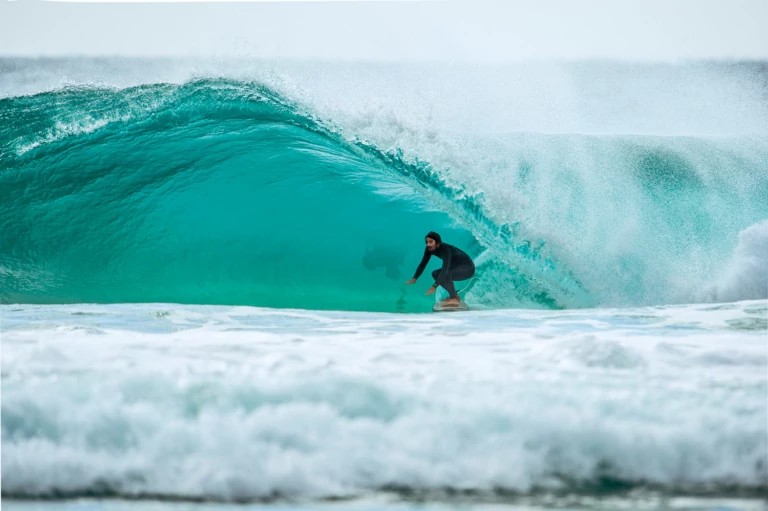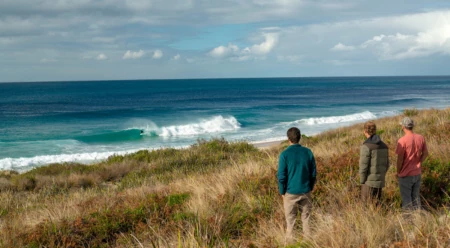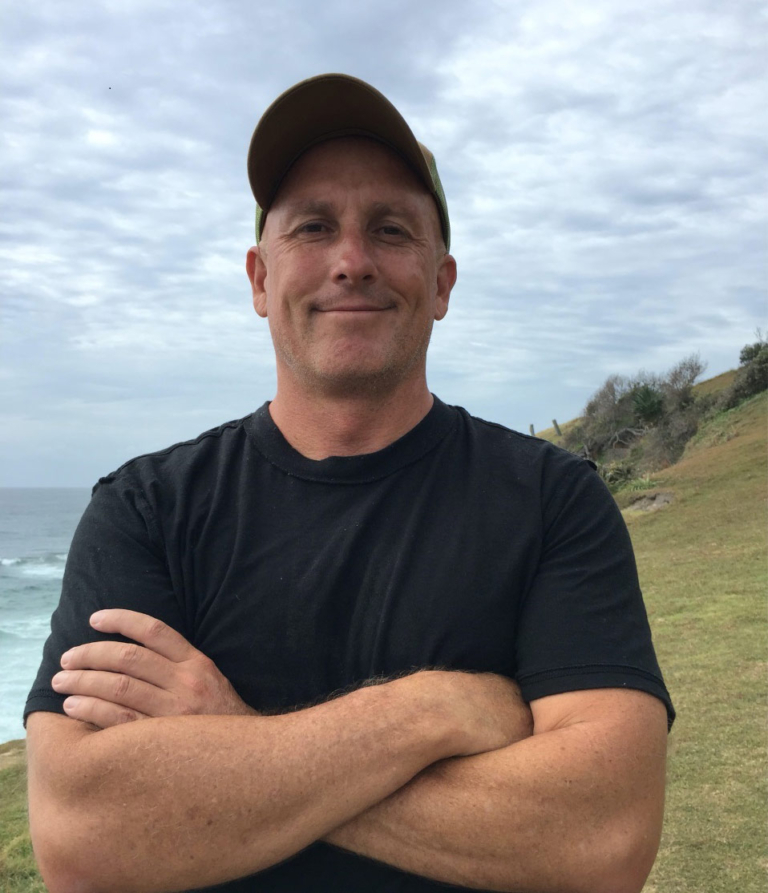Standing Up Against Industrial Fish Farming at a Unique Australian Beachbreak
Standing Up Against Industrial Fish Farming That Would Forever Alter A Unique Australian Beachbreak
The day we arrived on King Island we drove out to Martha Lavinia Beach, where we stood in the dunes and watched waves running down the beach—long left-handers breaking so fast they were almost impossible to surf. However, Martha Lavinia wasn’t famous for lefts—but for clean, geometric peaks. The waves looked nothing like the brochure.
When we drove back out the following morning, Martha’s looked completely different. A remarkable transformation had occurred under the cover of darkness. Instead of long lefts running down the beach, we were greeted with long rights running up. The storm system had tracked east overnight, and instead of the swell wrapping around the top of the island, it was now coming around the bottom.
Just under 40 miles in length, King Island is one of the last surviving pieces of the land bridge that joined Tasmania to the Australian continent during an ice age. When winter storms roll in from the Roaring Forties, swell wraps around the island, with the refracted waves meeting on the lee side at Martha Lavinia. Depending on the direction, Martha’s breaks either left or right—or, when conditions are ideal, as perfect peaks. It’s like nowhere else, but it might not be that way much longer.
As Dan Ross describes it, “Martha’s is really one of those special breaks. From the moment you first see it, with all those wedges coming together up and down the beach, you get that feeling like, ‘Wow, this is going to be one of the funnest days ever. This is why we surf.’” We surfed all morning on that second day. Midway through the session, Dan split his ear after being smacked by his board, so we drove him to the island’s hospital, stopping only for herds of dairy cows crossing the road. Dave Rastovich, meanwhile, was left surfing Martha’s alone, the only surfer on miles of untouched white beach.

Tapping one of King Island’s more sustainable resources, Dave Rastovich threads through another sand-bottomed tube on the Never Town set. Photo: Ted Grambeau
Our visit to the island had a purpose beyond simply get ting barreled at Mar tha Lavinia. We were there to finish our film Never Town, an exploration of how surfers are working to save Australia’s wild coastlines. In recent years, King Island—and more specifically, the area just off Martha’s—has been targeted as the proposed location for an industrial-scale salmon farm.
The farming of Atlantic salmon—a nonnative species—has boomed recently in the neighboring waters of Tasmania, where it’s now the most significant sector of an aquaculture industry that generated over AU$900 million in 2017. The growth has happened so fast that environmental monitoring and regulation have struggled to keep pace.
One case in point is Macquarie Harbour on Tasmania’s west coast, a once-pristine inlet that saw significant degradation as farmed salmon production grew eightfold from 2005 to 2016. The salmon are held in large sea pens in concentrations that don’t occur in nature—so unsurprisingly, as the population of farmed salmon grew, the inlet’s ecosystem began to suffer. At the same time, the Macquarie farms struggled with low oxygen levels, unsafe bacteria levels and disease outbreaks that caused large die-offs of the farmed salmon.
Under increased public scrutiny, the aquaculture industry began scouting for new locations beyond the main island of Tasmania—a search that brought a company called Tassal to King Island. In late 2017, Tassal was granted a permit to begin exploring the potential for salmon farming in a 48-square-mile area directly adjacent to Martha Lavinia. If the project proceeds, activists say it could include as many as 22 fish pens holding up to a million Atlantic salmon.
“The implications for King Island are devastating,” we were told by Charlie Stubbs, a retired teacher involved in the campaign against the fish farm proposal. “If you have a million Atlantic salmon in cages, that’s like 10,000 people going up to Martha Lavinia and crapping in the water every day.”
Though its population is only 1,592, King Island is home to well-managed dairy, beef and wild seafood industries that support close to full employment while having minimal impact on the surrounding marine ecosystem. Like Charlie, many of its residents have come to believe that introducing fish farms is not only unnecessary, but will also ruin Martha Lavinia and trash the island’s reputation for natural beauty and environmentally sound food production. Realizing their home would be forever changed if they didn’t act, Charlie and other islanders began lobbying the media, the Tasmanian government and the global surf community to help stop Tassal’s farms.
Though the company has stated its commitment to sustainable practices, after assessing the effects of fish farming in other locations, the King Island locals have a long list of valid concerns. First, there’s worry that pollution and debris from the fish pens would impact King Island’s healthy marine and littoral environment, harm sustainable wild fisheries, and put native species at risk by spreading disease and reducing the amount of available oxygen in the surrounding waters. There’s also concern that the extensive pen infrastructure required for industrial-scale farming would wreck Mar tha Lavinia’s unspoiled character while impeding natural currents, sandbar formation, and the size and strength of swells. And then there’s the rather visceral worry that more sharks would be drawn in to feed on seals attracted by the smorgasbord of caged salmon, posing a very real threat to the safety of surfers at Martha’s.
Through its ambassadors and activists in Australia, Patagonia has been standing shoulder to shoulder with the ongoing campaign to keep Martha Lavinia free of industrial fish farms. The fight is among several featured in Never Town—a rough-cut film that we’d brought along for its global premiere in the King Island Club in Currie, the island’s main town. Dan was there, with fresh stitches in his head, while Dave, despite having surfed seven hours that day, introduced the film through red eyes to the locals who’d gathered to see their island receive star billing.
“King Island is a prime target for a big corporation that wants to make a lot of money,” Dan commented, “because it’s so remote and such a small community. But what Tassal didn’t bargain for is that King Island is also a special place for surfers, and suddenly they weren’t just facing opposition from the islanders, but also from surfers all over the world. And to Charlie’s credit and the community there, they were on it straightaway, which is why they’re in a good place now in terms of fighting it.”
Premiering the film on King Island seemed perfect. It didn’t matter that we hadn’t quite finished the edit—we’d eventually splice the waves we’d caught that day into the final cut. What mattered was that the message of the film, about the power and potency of grassroots community activism, couldn’t have been better demonstrated than it was that night at the King Island Club. As the movie finished, the credits rolled and the locals didn’t move from their seats until the final frame. We knew they’d keep doing all they could to save Martha Lavinia, with Charlie’s words summing up their spirit.
“I believe we can make a difference. I honestly believe that things change if people are prepared to stand up and say, ‘This is worth protecting.’”
The fight against industrial fish farming at King Island continues, so we returned recently to lend further support. Stream our new short film with the latest updates, narrated by Dave Rastovich, at patagonia.com/artifishal. At the same link you’ll find another short, featuring Ramón Navarro, that examines the damage wrought by salmon farming in his native Chile. Both are companion pieces to Artifishal, a full-length documentary from Patagonia Films about wild fish and wild rivers, and how government and industry have mistakenly relied on farms and hatcheries to offset the impacts of overfishing and habitat destruction.

